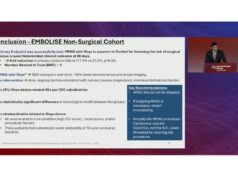 Arsenal Medical has announced the complete enrolment of an initial cohort of 10 patients in the EMBO-02 clinical study evaluating NeoCast for the treatment of chronic subdural haematomas (cSDHs) across three sites in Australia.
Arsenal Medical has announced the complete enrolment of an initial cohort of 10 patients in the EMBO-02 clinical study evaluating NeoCast for the treatment of chronic subdural haematomas (cSDHs) across three sites in Australia.
A company press release describes NeoCast as a next-generation, non-adhesive, solvent-free, liquid embolic material designed for deep distal penetration that is being assessed for its early safety and feasibility to embolise target vessels of a patient’s middle meningeal artery (MMA) in the prospective, multicentre, open-label EMBO-02 clinical trial.
The unveiling of data on the initial cohort took place at the ongoing International Stroke Conference (ISC; 5–7 February, Los Angeles, USA) via a late-breaking presentation by Laetitia de Villiers (Gold Coast University Hospital, Southport, Australia).
All MMA embolisation procedures in the trial were successfully completed with NeoCast, and all patients passed the 30-day safety endpoint with no device-related serious adverse events. On average, investigators were “very satisfied” with NeoCast’s acute performance and usability, highlighting the material’s ease of use, according to Arsenal Medical.
“NeoCast is a promising new material for treating cSDH,” said Tim Phillips (Neurological Intervention and Imaging Service of Western Australia [NIISwa], Nedlands, Australia). “NeoCast has differentiated performance characteristics. It is a uniquely responsive liquid embolic agent, and its physical properties allow continuous control and visualisation throughout the injection. The ability to penetrate the microvasculature with the material is very impressive, as are our early clinical and imaging results. I’m excited about the potential of NeoCast to address the limitations of currently available liquid embolics.”
“We are thrilled to announce the completion of enrolment of the initial cohort of EMBO-02,” added Upma Sharma, chief executive officer (CEO) of Arsenal Medical. “Our ability to quickly enrol highlights the growing need for interventions to manage chronic subdural haematomas. This marks another significant milestone in our mission to develop NeoCast as a new material for embolisation. This achievement would not have been possible without the dedication of the entire Arsenal team, our investigators and advisors, and the subjects who have been instrumental in advancing this promising therapy. We eagerly anticipate sharing the final results from EMBO-02 later as we progress toward larger studies.”









